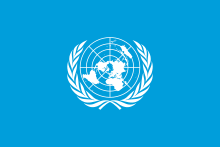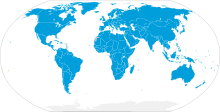Charter of the United Nations

The Charter of the United Nations (also known as the UN Charter) of 1945 is the foundational treaty of the United Nations, an intergovernmental organization.The UN Charter articulated a commitment to uphold human rights of citizens and outlined a broad set of principles relating to achieving ‘higher standards of living’, addressing ‘economic, social, health, and related problems,’ and ‘universal respect for, and observance of, human rights and fundamental freedoms for all without distinction as to race, sex, language, or religion.’ As a charter, it is a constituent treaty, and all members are bound by its articles. Furthermore, Article 103 of the Charter states that obligations to the United Nations prevail over all other treaty obligations.
Quotes
[edit]
- The Charter of the United Nations was signed on 26 June 1945, in San Francisco, at the conclusion of the United Nations Conference on International Organization, and came into force on 24 October 1945. The Statute of the International Court of Justice is an integral part of the Charter.
Preamble to the United Nations Charter (excerpt)
[edit]

The Preamble to the treaty reads as follows:
- WE THE PEOPLES OF THE UNITED NATIONS DETERMINED
- to save succeeding generations from the scourge of war, which twice in our lifetime has brought untold sorrow to mankind, and
- to reaffirm faith in fundamental human rights, in the dignity and worth of the human person, in the equal rights of men and women and of nations large and small, and
- to establish conditions under which justice and respect for the obligations arising from treaties and other sources of international law can be maintained, and
- to promote social progress and better standards of life in larger freedom,
- AND FOR THESE ENDS
- to practice tolerance and live together in peace with one another as good neighbours, and...
Chapter I: Purposes And Principles
[edit]Article 1 (excerpt)
[edit]The Purposes of the United Nations are
- To maintain international peace and security, to take effective collective measures for the prevention and removal of threats to the peace, and for the suppression of acts of aggression or other breaches of the peace, and to bring about by peaceful means, and in conformity with the principles of justice and international law, adjustment or settlement of international disputes or situations which might lead to a breach of the peace;
Article 2 (excerpt)
[edit]The Organization and its Members, in pursuit of the Purposes stated in Article 1, shall act in accordance with the following Principles:
- The Organization is based on the principle of the sovereign equality of all its Members.
- All Members, in order to ensure, to all of them the rights and benefits resulting from membership, shall fulfill in good faith the obligations assumed by them in accordance with the present Charter.
- All Members shall settle their international disputes by peaceful means in such a manner that international peace and security, and justice, are not endangered.
- All Members shall refrain in their international relations from the threat or use of force against the territorial integrity or political independence of any state, or in any other manner inconsistent with the Purposes of the United Nations.
Quotes about the Charter of the United Nations
[edit]Sorted alphabetically by author/source
- Following the horrific destruction left in the wake of World War II, the United Nations in its seminal and founding document, the Charter of the United Nations, set out to prevent future wars among member nations. The Charter’s admonition against war was also voiced in the lessons learned from the Nuremberg trials of Nazi war criminals in its condemnation of war: “starting or waging a war against a territorial integrity, political independence or sovereignty of a state, or violation of international treaties or agreements.” are crimes against peace and “makes all war crimes possible.”
- Buckminster Fuller, the twentieth century philosopher, described the Earth as a spaceship, and he wrote that all humans are really astronauts sharing residence on a planet travelling 60,000 miles an hour. He believed, "We are not going to be able to operate our Spaceship Earth successfully nor for much longer unless we see it as a whole spaceship and our fate as common. It has to be everybody or nobody." This is exactly the underlying philosophy that propels the United Nations. Unfortunately, modern educational systems were not built with such a global attitude. Instead, they have been designed first and foremost to develop loyal, national citizens. Certainly, there is nothing wrong with celebrating national heritages and traditions, however, there must also be significant attention devoted to sharing stories from other nations. Schools should help further national goals and interests, but they also must enable us to understand the whole world and our role in it... Having a global education and being a world citizen is the key element for peace and for all elements of progress outlined in the UN Charter. Indeed, that is the foundation for the necessary new skill-set at the conference table. Being able to look at the problems through the eyes of others reduces fears and misunderstandings that breed conflict and confusion. We must learn to work together; we must learn more about each other; and we must come to the table with resolve to solve those problems no single country can address.
- J. Michael Adams, Preparing the Next Generation to Join the Conference Table, UN Chronicle - Volume 47, Issue 3, (2012)
- We just heard from the Minister of Honduras. Let us recall that United Fruit Company essentially ran his country for a long time. United Fruit’s attorney was US Secretary of State John Foster Dulles, and his brother Allen Dulles was the head of the CIA. On behalf of United Fruit Company, the two Dulles Brothers conspired to overthrow President Jacobo Árbenz of Guatemala, next door to Honduras, in order to stop the land reforms that Árbenz was trying to implement. So, yes, we have a global food system, but we need a different system. That different system must be based on the principle of universal human dignity in the Universal Declaration of Human Rights, the principle of national sovereignty in the UN Charter, and the economic rights in the Universal Declaration and the International Covenant of Economic, Social, and Cultural Rights. In the Universal Declaration, all governments agreed that social protection is a human right, not merely a “nice thing,” or a pleasant thing, but a basic human right. That was 73 years ago.
The Sustainable Development Goals are our generation’s pledge to honor the Universal Declaration of Human Rights. Yet I come from a country that not only doesn’t care about the world’s poor, it doesn’t even care about its own poor. One in seven Americans is hungry right now, but one political party cares about little more than cutting taxes for the rich and filibustering any real solutions to poverty.- Jeffrey Sachs' Speech at the UN Food Systems Pre-summit, Speech transcript (July 27, 2021)
See also
[edit]- Crimes against humanity
- Crimes Against Humanity Initiative
- International law
- Rule of law
- United Nations
- War crimes

